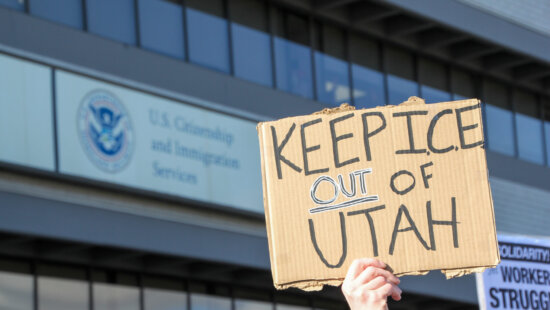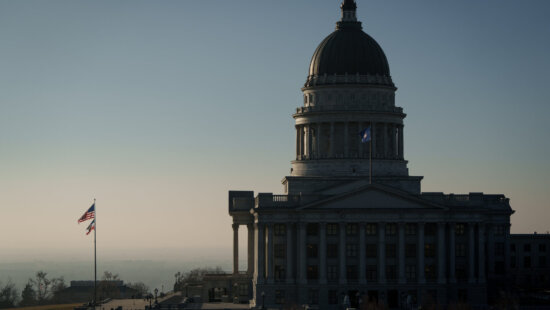News
Navajo politicians ask Biden to stop company transporting uranium from Arizona to Utah

The Navajo Nation and American flags fly in Monument Valley. Photo: Unsplash // Chloe Stein
By: Kyle Dunphey, Utah News Dispatch
With uranium production ramping up in the Four Corners area, politicians on the Navajo Nation are worried that the transportation of ore through the reservation could endanger residents.
Energy Fuels, one of the country’s largest uranium producers, is set to begin trucking uranium ore from its mine in Arizona near the Grand Canyon to the White Mesa Mill in southern Utah.
Earlier this week, Navajo Nation President Buu Nygren signed a resolution asking President Joe Biden to use his executive authority to prevent the company from transporting ore through the reservation, citing health and environmental concerns.
“Our Navajo people, land, and water are very precious to us, and we are unwavering in our stance against uranium,” Nygren said in a news release. “This resolution is a direct result of the collaboration of our legislative and executive bodies of government. Together, we are sending a powerful message to Washington D.C. to halt uranium on Navajo.”
The resolution was signed by Navajo Nation Speaker Crystalyne Curley, and Casey Allen Johnson, vice chair of the Resources and Development Committee.
The uranium ore has “no place sharing these roadways with school buses full of our children and the many communities that are in harm’s way,” Curley said in a news release.
“Transporting a radioactive substance poses environmental concerns and direct health risks to the Navajo people, clean water, and livestock. The routes of transporting the uranium travel many miles within the Navajo Nation,” the release reads.
A 2012 law from the Navajo Nation bars the transportation of uranium within the reservation. But according to the tribal government, the law does not apply to state highways.
So Energy Fuels is not breaking Navajo law by using state Route 160, which goes through the heart of the reservation and through the Four Corners area — and state Route 89, which skirts the western part of the reservation into Page, Arizona, near the Glen Canyon Dam.
Energy Fuels’ response
Curtis Moore, senior vice president of marketing and corporate development at Energy Fuels, said the transportation of uranium ore is “far less dangerous” than other materials routinely hauled on state highways, like gasoline, propane, chemicals and hazardous waste.
“We deeply respect President Buu Van Nygren for his efforts to protect the Navajo Nation and its land, water and people. However, uranium ore haulage does not threaten these values in the least,” Moore said.“We want to assure the Navajo Nation that Energy Fuels takes transportation very seriously, and we meet or exceed all applicable U.S. Department of Transportation laws and regulations regarding the transport of uranium ore.”
Between 2007 and 2015, Energy Fuels hauled roughly 300,000 tons of uranium ore on those same roads — the company says there were no incidents, spills or “additional radiation exposure to residents along the route” during that timeframe. The company said it will notify the Navajo government when trucking begins.
“We are willing to engage in dialogue with the Navajo Nation and other communities to address their concerns and seek mutually beneficial solutions,” Moore said, telling Utah News Dispatch that the ore being transported are basically chunks of rock that, if spilled, wouldn’t seep into groundwater.
“In the unlikely event of an accident or anything else that results in the spillage of ore, the cleanup is relatively simple, and we will clean it up completely,” he said.
The resolution from the Navajo Nation comes on the heels of a train derailment near the Arizona-New Mexico border on the reservation. According to the Navajo government, several train cars were carrying flammable materials that resulted in a fire, and authorities issued an evacuation order within two miles of the incident.
“We just experienced a train derailment a few days ago that affected many of our tribal members,” said Johnson with the Resources and Development Committee. “If it can happen to a train, it can happen to a semi or diesel truck hauling these materials. Safeguarding our people is our inherent right. The transportation of uranium across our lands fundamentally questions our sovereignty. We should not be compelled to compromise our sovereignty.”
Uranium mining returns to Utah, Arizona
Uranium mining resumed in Utah earlier this year after a nearly decade hiatus, fueled by Congress passing a ban on Russian uranium imports amid its invasion of Ukraine.
In response to a focus on domestic production, Energy Fuels commenced uranium mining at three sites, two in Utah and one in Arizona.
In Utah, Moore said the company is rehabbing two existing mines near Moab, off of state Route 46 near the town of La Sal.
The company operates the White Mesa Mill, the country’s only operating uranium mill located about 85 miles south of Moab between the Ute Mountain Ute Reservation and Bears Ears National Monument.
At White Mesa, uranium ore pulled from the mines is processed into a sand-like substance, placed in a steel drum and shipped to a facility in Illinois. There, the uranium is enriched and further processed to meet specifications for specific nuclear power plants.
The White Mesa Mill has a controversial history, with many Ute Mountain Ute tribal officials in staunch opposition to its operations. Originally built in the late 1970s to process uranium ore, the mill evolved into a radioactive recycling center, taking in waste from across the U.S. and the world.
“As the people who have lived here for milenia, it’s pretty disturbing to have a company say, ‘Oh yeah, we’ll take your uranium waste, you can pay us handsomely for that, and we’ll put it in the ground here forever,’” said Scott Clow, environmental programs director for the Ute Mountain Ute Tribe, in an interview earlier this year.
“One of the things that we’ve been concerned about for a long time with the mill is what information is available publicly and what the reality is — whether any corners are being cut on safety, public health and the environment,” Clow said.
Each year, members of the Ute Mountain Ute Tribe hold a protest. High-ranking tribal officials have repeatedly called for the mill’s closure, with a 2021 tribal council resolution stating, “the operations of the White Mesa Mill has had severe health impacts on the residents of White Mesa and should cease entirely.”
“The wind comes down off the mountains and blows across the mill site towards the community, and that brings some pretty foul odors with it,” Clow said. “We’ve got hundreds of acres of waste out there that this breeze is blowing over. That’s just constant.”
As production at White Mesa ramps up, Clow said the tribe will increase its air quality and groundwater monitoring in the community to see if there are any negative impacts.
“More uranium production is going to mean more waste and more likelihood of further pollution to that groundwater,” he said.


















